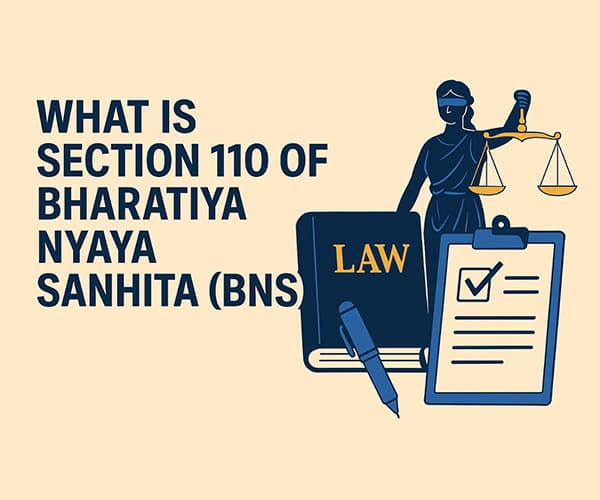What is Section 110 of Bharatiya Nyaya Sanhita (BNS)?

Section 110 of Bharatiya Nyaya Sanhita (BNS) is among the pivotal provisions introduced with India's post-2023 criminal justice reforms. With the BNS replacing the longstanding Indian Penal Code (IPC), Section 110 has become highly significant in the evolving landscape of Indian criminal law, and understanding its scope is essential for anyone concerned with legal compliance, defence, or awareness of the new penal statutes.
Section 110 BNS addresses the offence of causing hurt by endangering life or personal safety of others. It specifically criminalizes acts that, while not amounting to grievous hurt or attempt to murder, still result in injury to another person through actions that are reckless, negligent, or intentionally performed with disregard for human safety. The section covers a wide range of conduct, including dangerous driving, hazardous handling of machinery, negligent discharge of firearms, or any activity likely to endanger the life or well-being of others.
Notably, Section 110 BNS brings a more nuanced framework for prosecution and defence than its IPC predecessor, reflecting contemporary judicial standards regarding culpability, negligence, and personal responsibility. It allows for prosecution of those whose actions fall short of gross violence but still cause harm by compromising the safety of others. The provision's language is intentionally inclusive, ensuring that new and emerging forms of dangerous or negligent behaviour, such as digital or technological causes of harm, can be addressed by Indian courts.
The penalty structure under Section 110 of Bharatiya Nyaya Sanhita is designed to be both deterrent and proportional, with punishment ranging from imprisonment to fines, depending on the severity and impact of the injury caused. The section is especially important in cases involving traffic offences, workplace safety, public events, and other scenarios where even non-malicious actions could endanger lives.
For legal practitioners, defendants, and the general public alike, the introduction and rigorous enforcement of Section 110 BNS underscore the Indian legal system's prioritization of public safety, accountability, and modern standards of criminal justice. It urges individuals and organizations to exercise utmost caution in potentially risky activities and establishes clear grounds for holding people accountable if their actions cause harm.
If you find yourself or a loved one implicated in a case under Section 110 of Bharatiya Nyaya Sanhita, swift and expert legal guidance is key to understanding your rights, mounting an effective defence, and navigating the complexities of the new code. The legal team at Vakeel Saab is equipped to handle the nuances of BNS cases, providing clear legal strategies and robust representation. Visit www.vakeelsaab.com or call +91 72848 72848 for a confidential consultation with leading criminal law specialists in India.
Frequently Asked Questions
Q1: What types of acts can be prosecuted under Section 110 of Bharatiya Nyaya Sanhita? Section 110 BNS can apply to acts like reckless driving, negligent handling of hazardous materials, careless operation of machinery, or any reckless conduct endangering life or causing hurt.
Q2: How is Section 110 BNS different from similar provisions in the IPC? Section 110 BNS adopts updated language, covers a broader range of negligent or dangerous acts, and is designed to encompass new forms of endangerment not previously anticipated under the IPC.
Q3: Is Section 110 BNS only about intentional harm? No. Section 110 BNS also addresses negligent or reckless actions where there was no direct intent to harm but which still resulted in injury or danger to others.
Q4: What is the punishment for convictions under Section 110 BNS? Punishments include imprisonment, fines, or both, and the exact sentence depends on the specifics and severity of the case.
Q5: Can Section 110 BNS be used in cases of public accidents or disasters? Yes. It is relevant for public accidents, mass safety violations, or disasters caused by individual or collective negligence.
Q6: Does insurance or compensation cover liability under Section 110 BNS? While insurance might cover civil liability, criminal prosecution under Section 110 BNS is distinct and can lead to imprisonment or fines irrespective of insurance payouts.
Q7: Are traffic offences covered under Section 110 BNS? Yes. Serious traffic violations resulting in hurt or endangerment can be prosecuted under this section.
Q8: Can victims claim compensation under Section 110 BNS? Separate from criminal punishment, victims may pursue compensation through civil proceedings or court-ordered restitution.
Q9: How does one defend against Section 110 BNS charges? Defense may involve proving lack of negligence, demonstrating due care, or establishing absence of causal connection between the accused's act and the resultant harm.
Q10: Where can I get the best legal help for a Section 110 BNS charge? Contact Vakeel Saab at www.vakeelsaab.com or call +91 72848 72848 for expert criminal defence and guidance specific to Section 110 of Bharatiya Nyaya Sanhita.
Tags:Section 110 Bharatiya Nyaya Sanhita, Section 110 BNS, Section 110 BNS punishment, Section 110 criminal liability, Section 110 legal process, hurt endangering life BNS, negligence BNS law, Section 110 BNS defence, Bharatiya Nyaya Sanhita explained, BNS criminal law, Vakeel Saab legal help, dangerous act BNS, criminal lawyer BNS, Section 110 BNS case law, public safety criminal law, new IPC Section 110, best criminal lawyer India
Related Articles
The Importance of Consulting a Property Lawyer for Real Estate Issues
Blog
How to File a POCSO Complaint in India: Step-by-Step Legal Process
Blog
What punishments does the law give for giving, taking, or asking for dowry?
Blog
Reasons for the Increasing Divorce Rates in India
Blog
What is a Special Leave Petition? Meaning, Features, Process & & Who Can File?
Blog
What Is the Difference Between Mutual Divorce and Contested Divorce?
Blog